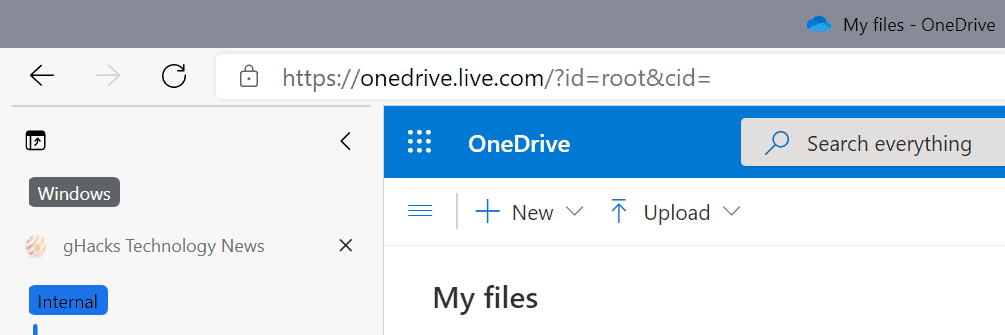Microsoft increases OneDrive's maximum file size to 250 Gigabytes

Microsoft announced yesterday that it raised the file size limit of its OneDrive file storage platform to 250 Gigabytes per uploaded file for all Microsoft 365 customers.
The previous limit was 100 Gigabytes per file for paying customers, and the limit before that 15 Gigabytes per file.
The new limit applies to all Microsoft 365 customers and will be rolled out "by the end of January" according to Microsoft. General availability will be achieved by the end of the first quarter of 2021.
The new file size limit applies to uploads of files into OneDrive but also SharePoint and Microsoft Teams. All paying customers will benefit from the change, including home users.
Why is Microsoft making the change?

Microsoft notes that it has noticed an increase in remote work and remote learning, and that files are getting larger and larger. Microsoft employee Ankita Kirti mentions 4K and 8K video files, 3D models, CAD files, and other types of files that require a lot of space.
As remote work and learning increases so does the need to reliably and securely share large files-4K or 8K video files, 3D models, CAD files, or large scientific data sets-with co-workers, clients and peers.
The new file size limit is achieved through storage optimizations according to Microsoft. The company splits large files into chunks, each encrypted with a unique key, and backs them up on Azure Storage.
Thanks to differential sync, OneDrive will only transfer parts of files that have changed to reduce the time it takes to upload changes to the online storage.
OneDrive's storage plans
Free OneDrive users, everyone with a Microsoft Account basically, get 5 Gigabytes of storage. The first paid option, OneDrive Standalone 100GB, upgrades storage to 100 Gigabytes. All other options require a Microsoft 365 plan; these come as Personals and Family plans, and as business and Enterprise plans.
Microsoft 365 Personal is available for $69.99 per year, often discounted at third-parties, and includes 1000 Gigabytes of space. The price of the Microsoft 365 Family account is $99.99, and it includes 6 Terabytes of storage (6000 Gigabytes), but storage is limited to 1000 Gigabytes per user as well.
Closing Words
Home Microsoft 365 subscribers benefit from the increased file size limit, provided that they upload large files to the storage. It seems unlikely that many will, considering the huge size of files and the time it takes to upload the initial file to OneDrive. Also, a single upload of such a file will take up a quarter of the available space on OneDrive.
The new file size limit on OneDrive is especially useful to researchers and business customers who work with large files, e.g. large video files or scientific files.
Now You: do you use an online storage service? What is the largest file you ever uploaded to it? (via Born)






















I uploaded all my cat and grandma pictures to Google Drive I have never felt more safer with my “VERY IMPORTANT FILES” not hiding in “SUPER SECRET SAFE SERVERS” in my basement.
Alternatively you can always run a private cloud over a cluster of networked machines but then that’s cheating and thinking outside the box.
:)
Isn’t it better economy and safer to buy a couple of 1Tb drives, cost spread over 2-3 years?
It is more about reliability than cost (if you truly value your data.)
Now, the main issue with “the cloud” is they have your data not you.
Not only that, your data can be stolen or duplicated. I know that is what is encryption for, but still that is only as good as your password/passphrase.
Last, if anything weird happens (e.g. the company disappears for one day to another,) you can end up empty handed (if your only backup is the cloud, or not backup at all giving the cloud does it for you.)
Depends on your objective. There are other considerations than the economy.
OneDrive is FAR more “portable” if you are in locations with internet access. If not, then a physical drive may fit your needs better.
OneDrive is much easier for sharing files and folders (right click and enter email address). With a hard drive, you need to copy to usb thumbdrive / DVD (then physically hand it over) or email or upload to a cloud drive anyway. Plus, you may have limitations on the size of file you can share (e.g. email limits).
Then there is backup and recovery. OneDrive is probably more robust and less susceptible to data loss vs physical hard drive in your home or office, all else being equal. (Though it is good practice to use both forms for backup of critical data).
There are other issues as well.
And, with how technology changes, especially on price vs capacity, is a 3 year time-frame relevant? That kind of calculation might be more appropriate for other assets that don’t decay in value as quickly.
>Thanks to differential sync, OneDrive will only transfer parts of files that have changed to reduce the time it takes to upload changes to the online storage.
Is this like Dropbox’s “delta-sync”? Does it apply to all file types and file sizes? So if I have a 1 GB zip file and add a 1 MB file to it, it will only sync the 1 MB bit?
Yes, OneDrive does support delta-sync functions AFAIK.